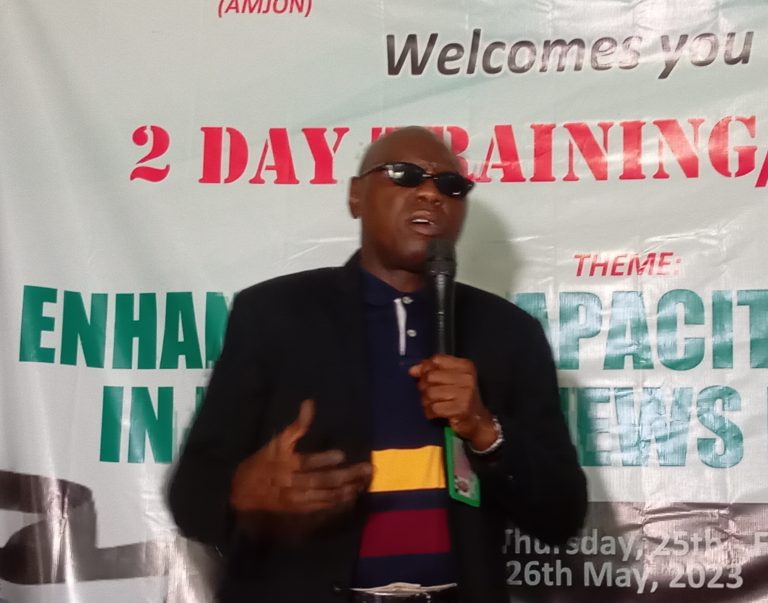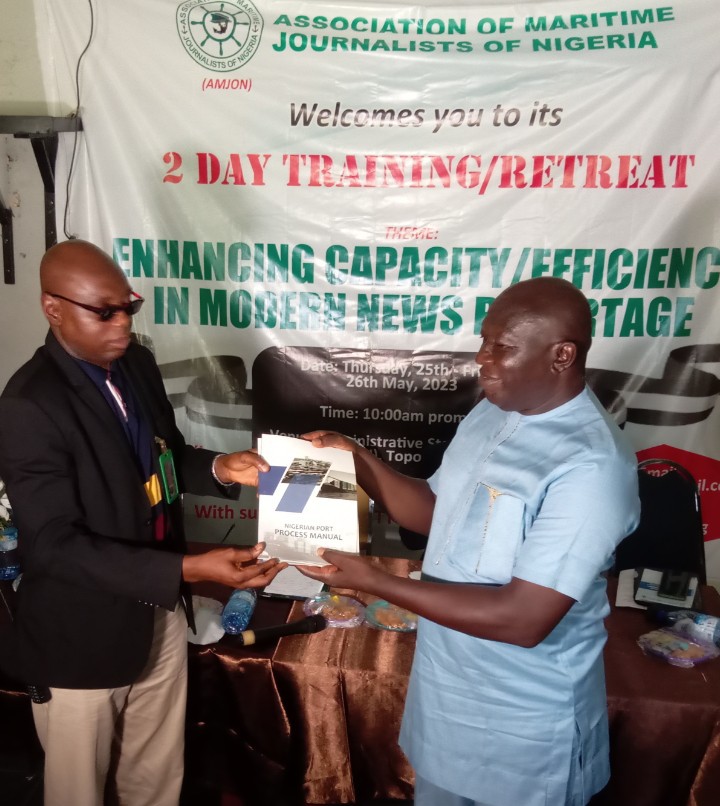News
‘Efficient Port System Encourages Foreign Investment’ – Fadipe

BY EGUONO ODJEGBA

Fadipe speaking during the workshop
The National Coordinator, Port Standing Task Team (PSTT), Moses Fadipe has said that transparent and efficient port system is a catalyst to sustained foreign investments, which has the prospect of deepening the port industry, in addition to enhancing the nation’s revenue generation system.
Fadipe who was speaking at a 2-Day Training Retreat organised by the Association of Maritime Journalists of Nigeria (AMJON) at the Administrative Staff College of Nigeria (ASCON) in Topo, Badagry, yesterday, hinted that the PSTT has been enpowered to bark and bite, noting that the team has the power to arrest, prosecute and sanction defaulting stakeholders, who fail to comply with the operational guidelines in the nation’s ports.

Fadipe presenting a copy of the Nigerian Port Process Manual document to AMJON president, Paul Ogbuokiri
The PSTT Coordinator while presenting his paper titled, “Port Standing Task Team’s Relationship with Government Agencies in Tackling Corruption at the Ports”, explained that the team’s role is to improve transparency, enhance revenue generation and tackle corruption, in order to encourage local businesses and foreign investments, alike.
He further explained that, the PSTT collaborates with, and monitors the activities of all relevant government agencies and other key players in the port to ensure that they carry out their mandate as according to the laws establishing them.
“The PSTT is responsible for the enforcement of the provisions of the Nigerian Port Process Manual (NPPM) which includes the implementation of the Standard Operating Procedures (SOPs) for all port-related activities.

Fadipe (left) being presented with the AMJON award of excellence by the Customs National PRO, Maiwada
“The PSTT ensures that all government agencies and private sector operators comply with the NPPM, thereby improving the ease of doing business at the ports. The PSTT also carries out necessary anti-corruption measures to dismantle traffic logjams fueling corruption within the port logistics rings at port Western and Eastern ports of the country

“Revenue generation is not a primary objective of the PSTT and so the team cannot be said to be directly involved in revenue generation. However, the NPPM which the PSTT enforces seek to establish a business environment in the country that would lead to improved revenue generation at the ports.
“This is done by ways of plugging leakages to ensure all revenues generated from port operations are remitted to the appropriate government coffers. The PSTT’s efforts are also aimed at encouraging foreign investors and local businesses to do business in Nigeria, as they are assured of a transparent and efficient port system”, he said.
Highlighting the objective and the gains already recorded by the team, Fadipe stated that many industry stakeholders have attested to the reduction in the cost by virtue of the job of the PSTT which has also largely led to the reduction of operational delays and inefficiencies in the ports.
“In the area of vessel clearance, the level of incidence of infractions where ship captains feel unfairly treated has reduced tremendously. This has been attributed to the PSTT’s efforts in enforcing adherence to the provisions of the NPPM and carrying out necessary anti-corruption measures.
“In 2019, there were 266 incident reports with an average demurrage of $20,000 per day. The PSTT was able to prevent unnecessary delays due to quick case resolutions. Case resolutions were down from 7-10 days in the past to 1-8 hours. This trajectory has continued to this day and the amount saved in daily demurrages could be estimated in billions of naira in addition to savings in other operational costs”.
Speaking on its general and specific roles in the enforcement of the Nigerian Port Process Manual ( NPPM), he said:
“The PSTT operates on a more collaborative basis, with all members working together to achieve its goals in three broad phases. Phase One: Monitoring of Joint Boarding Exercises and Rummaging” and
“Phase Two: Monitoring of Joint Cargo Examination to ensure that goods are cleared in a timely and efficient manner. Phase Three: Dismantling of Illegal Checkpoints and Extortion Points at the Port Logistics Ring tagged “Operation Free the Port Corridor”, he said.
On challenges, the PSTT boss lamented that members are exposed to risks and dangers such as physical attacks, verbal abuse, and threats to their lives and families, as well as attempted bribes while carrying out their duties.
This is even as he said the team has devised strategies aimed at mitigating the stated risks, with the provision of security personnel to see to members’ safety, inclusive of the provision of protective gear, and basic training to ward off attacks.
The PSTT was established in 2021 to monitor and enforce compliance with the provisions of the NPPM. It is made up of various government agencies, including the Nigerian Shippers Council (NSC), the Independent Corrupt Practices and Other Related Offences Commission (ICPC), the Department of State Services (DSS), and the Nigerian Ports Authority (NPA).




























